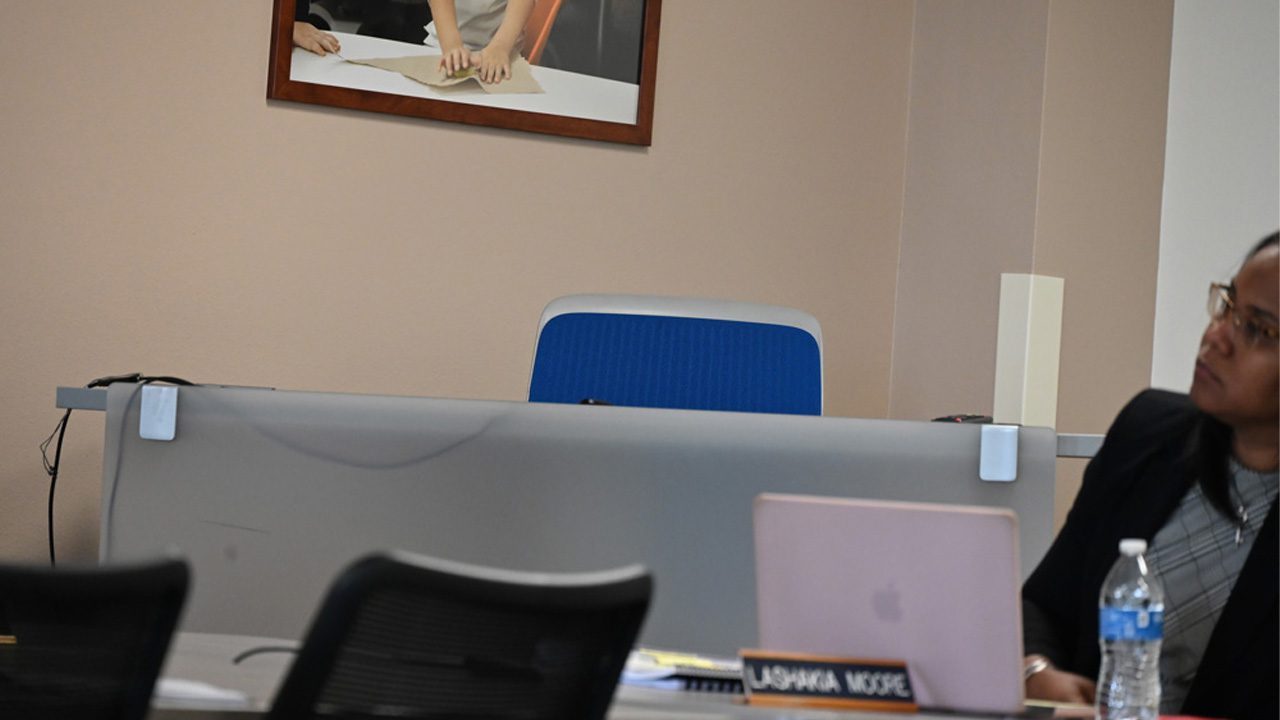
School District Attorney Kristy Gavin Is Fired as Board Turns to Evaluating 2 Firms for New Legal Representation
Flagler Live | January 23, 2024
Ending weeks of uncertainty, Kristy Gavin, the Flagler County School Board’s attorney since 2006, was fired on Monday, a district spokesman confirmed today. The firing is ostensibly for cause, though it sets up a likely legal battle between Gavin and the district, which severed her contract 18 months before its end.
The district had not released the letter nor made any public announcement about Gavin, whose office was dark, its door closed, this morning before the first of three meetings of the School Board. When the board did meet–in a workshop to rank two law firms it is exploring for its next legal representation–Gavin was never mentioned. The board met without an attorney present, Gavin’s customary perch in a corner of the meeting room sitting empty for the first time at any meeting or workshop of the board ion nearly two decades. (“This information will be available to the public on Monday, February 5th,” the superintendent’s executive secretary wrote in response to a request for the letter this morning.)
Board members were expected to discuss the firing at a 1 p.m. workshop today, in the same meeting room, again without an attorney present. The board had agreed late last year to give negotiations between Gavin and the district a chance either to achieve a mutually agreeable separation or to transition Gavin to a role as staff attorney, answering to Superintendent LaShakia Moore exclusively.
Neither goal was attained. That left Board Chair Will Furry waiting since the end of December on Board member Sally Hunt, and possibly Christy Chong, to produce a list of causes that, by contract, are the only way Gavin could have been fired. But it remains unclear whether such causes were produced, or how, as the district is so far maintaining silence on the document trail.
The board met this morning at 9:30 in what was to be the first of three meetings. The morning session was designed as a review of two submittals by law firms, GrayRobinson of Tallahassee and The Douglas Law Firm of St. Augustine.
Board member Cheryl Massaro immediately objected to the direction of the meeting for being, in her view, in violation of district policy and the board’s own direction. The policy provides for the board to seek out legal representation for itself and the district. But the proposals before the board members today was strictly for as-needed board representation, not district representation. When Massaro had agreed to explore that avenue, it was on the assumption that Gavin would be retained as the district attorney. That no longer being an option, the premise for today’s meeting was no longer valid, Massaro argued.
“Policy has to be followed. Policy has not been changed,” Massaro said, next citing state law to buttress her point. Massaro is concerned about ending up with two legal firms representing the district–one for the board, one for the staff–with mounting costs. Board member Colleen Conklin was equally concerned–and confused: she did not know–in fact, the board does not yet know–whether there will be one legal team or two, and what those costs would be.
Furry said the board was not hiring a firm just yet, but merely evaluating them. “We’re doing our due diligence, and there’ll be a time when we decided we’re going to move forward in this structure,” he said. The board has interim counsel to bridge the gap. He said a separate job description was approved for a separate district attorney.
When Conklin asked whether there was an explicit consensus for separate legal representation for the district staff, Moore stopped her and the rest of the board from answering, out of concern that the special workshop’s structure would not allow for that sort of consensus. So they deferred the conversation to their afternoon meeting.
That left the substance of the two law firms’ responses before them, and their rankings. Very quickly, Furry, Chong and Hunt ranked Douglas Law First first, while Massaro and Conklin ranked GrayRobinson second, though by the end of the meeting, and after nearly 90 minutes of discussion, the board members’ positions were not nearly as immovable. Hunt wanted to change her vote to GrayRobinson, citing–for example–the fact that Douglas Law Firm includes a Flagler Palm Coast High School graduate among its associates. Hunt does not want the next legal representation for the board to have any local tentacles. Chong agreed.
Conklin and Massaro were buoyed by GrayRobinson’s clout as a lobbying firm in Tallahassee and by the firm’s long list of clients in education, though most of those are in higher education. They also liked its flat fee structure, covering broad swaths of legal needs. They were concerned about Douglas Law Firm’s lack of experience, compared to GrayRobinson, and its costs: $9,000 a month (the figure of $9,500 was also mentioned) at a bare minimum–three meetings a month–not including any extraneous work, all of which would be billed separately.
The factual details of each submittal could not be independently examined. The school board is approaching this process differently than any board before it–indeed, differently than any local government before it. With its procurement director, Kristen Corolla, leading the process, it is invoking a section of state law that exempts certain legal documents from public view during the procurement process, even, allegedly, after those documents have been passed to the School Board members. Each board member had the two firms’ submittals, but the district denied a public record request for those submittals, and continues to do so.
Corolla had also intended to hold today’s meetings in two segments–one in the open, one behind closed doors, with the school board acting as the district’s “procurement team,” again a move with no precedent. State law does provide a public-meeting exemption for procurement teams. But whether that exemption applies to a full elected body–whose authority to hold closed-door meetings is strictly limited–would be highly unusual. By the time Corolla sought to close the meeting (there was no public in the room but for one reporter) Moore, the superintendent, recommended adjourning the meeting altogether, since it had attained its ends: the board agreed to invite both law firms to present in the next few weeks, and answer questions.
By then, the rankings may mean little, while the board could also decide to restart the search. “I just kind of see today as a starting point,” Furry said. “I don’t want to make a knee jerk decision here and we don’t need to.”





